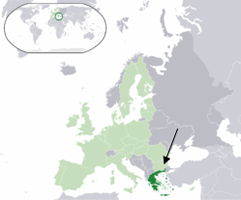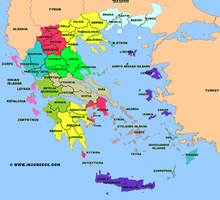National Symbols


Demographics – Geography
Population : 10.815.197 legal citizens (Census 2012)
Structure : Capital – Athens.
13 administrative regions are divided into 51 counties and 1 autonomous region (Mount Athos)
Language : Greek is the official language by 98% of the population. There are many non- official Greek dialects.
Currency : Euro (€) as of 2001.
Previously : Drachma
Government System : Presidential Parliamentery Democracy
Members of Parliament: 300
Member of the EU in 1981
Religion : Greek Orthodox 98%, Muslim 1,3%, other 0,7%
Time Zone : ZMT+2 hrs
Electricity Power : 220 V AC (50 Hz)
Calling code : +30
Internet TLD : .gr
Free Wi-Fi at most coffee shops,restaurants & city spots.
Driving from : the Right
The position of Greece at the crossroads between Africa, Asia and Europe has undeniably played a large role in the diverse and often turbulent history of Greece.
Greece, officially the Hellenic Republic is a country located at Southeastern Europe, southwarfds from the end of the Balkan Peninsula. The country borders by land to the north with Albania, Fyrom and Bulgaria, and by sea with Turkey to the east. The Aegean Sea lies to the east, the Ionian Sea to the west, the Libyan Sea (Africa) to the south. Its large number of islands lies on all of its seas (over 3000). It has a surface of 131.957 klm2 bordelrine of 1.228 klm, 14.800 klm coastlines.

Location of Greece (dark green)
– In Europe (green & dark grey)
– In EU (green)

While today’s Greece is confounded within the modern borders, in ancient Hellenic civilization it expanded throughout the Mediterranean. Besides the traditional mainland, the islands, and the coast of Asia Minor, Hellenic colonies existed in Italy, Sicily, France, Spain, Libya, and all around the Black Sea. With the conquests of Alexander the Great Hellenic civilization attained its widest reach. During the Hellenistic era Greek culture expanded to include Asia Minor, the Middle East, Egypt, and the land further East to the Western parts of India, and as far north as today’s Afghanistan.
Climate
The climate in Greece is typical of the Mediterranean climate: mild and rainy winters, relatively warm and dry summers and, generally, extended periods of sunshine throughout most of the year. A great variety of climate subtypes, always within the Mediterranean climate frame, are encountered in several regions of Greece. This is due to the influence of topography (great mountain chains along the central part and other mountainous bodies) and on the air masses coming from the moisture sources of the central Mediterranean Sea. Thus, the weather in Greece varies from the dry climate of Attiki (Athens’ greater area) and Eastern Greece in general, to the wet climate of Northern and Western Greece.
In climatological terms, the year can be broadly subdivided into two main seasons : The cold and rainy period lasting from mid-October until the end of March, and the warm and dry season lasting from April until September. During the first period the coldest months are January and February, with a mean minimum temperature ranging on average between 5 -10 degrees Celsius near the coasts and 0 – 5 Celsius over the mainland & with lower values (generally below freezing) over the northern part of the country.
Long stretches of consecutive rainy days are infrequent in Greece, even during the winter, and the sky does not remain cloudy for more than a few days in a row, as it does in other regions of the world. “Bad weather” days in winter are often interrupted, during January and the first fortnight of February, with sunny days, known as ‘Halcyon days’ since ancient times. The winter is milder in the Aegean and Ionian Islands compared to Northern and Eastern mainland Greece.
During the warm and dry period the weather is usually stable, the sky is clear, the sun is bright and there is generally no rainfall. There are, however, infrequent and brief intervals of rapid rain or thunderstorms chiefly over mainland areas. The warmest period occurs during the last ten days of July and the first ten days of August, when the mean maximum temperature lies between 29.0 and 35.0 degrees Celsius. During the warm period the high temperatures are tempered by fresh sea breezes in the coastal areas of the country and from the north winds, known as ‘Etesian’, blowing mainly in the Aegean.
Culture
Modern Greece traces its roots to the civilization of ancient Greece, generally considered the Cradle of Western Civilization. As such, it is the birthplace of Democracy, Western Philosophy, the Olympic Games, Western Literature and Historiography, Political Science, major Scientific and Mathematical Principles, Geography, Biology, University Education, and Western Drama, including both Tragedy and Comedy. This legacy is partly reflected in the seventeen UNESCO World Heritage Sites located in Greece, ranking Greece 7th in Europe and 13th in the world.
Communication : Generally Greeks are warm, friendly and helpful with a high sense of hospitality. The vast majority speaks English although many of them speak other languages as well. The letters of the Greek alphabet are different from those of the Latin alphabet used for English. There are only 24 letters. The word “alphabet” is based on the first two letters of the Greek alphabet, alpha and beta. Body language and gestures are very important in communication. When they talk to strangers or older people, Greeks use the plural to convey politeness and respect.
Dresscode : Dressing is casual in everyday life, so you can wear whatever feels comfortable. Lightweight clothes (cotton is best) during summer months, including protection from the midday sun and sunglasses. Light sweaters are needed for evenings, especially on the islands. Waterproofs are advised for spring and autumn. Winter months can be quite cold, especially in the northern mainland, so normal winter wear will be required.Styrdy shoes will fit perdect if you plan to visit rocky ground with ancient ruins. People tend to dress up a little more stylish in the evening when going out for coffee, dinner or night club. If you visit to a religious site (churches) be sure to dress appropriately. In visiting Monasteries, wear a shirt with sleeves, or cover your shoulders with a shawl before entering and ensure that you have on long pants, shorts or a skirt that reach well below your knees.
Safety : Greece is a safe and hospitable country overall. People are warm and friendly. Crime rate is the lowest in Europe. Only be alert of pick-pockets in crowdy places.
Education in Greece : Greek law requires children to go to school from age of 6. There are three stages of school before university. All children aged 6 to 12 must attend primary school followed by three years at gymnasium, and another three years at lyceum. All public education and textbooks in Greece are free and there are no tuition fees. In most Greek high schools the curriculum includes the study of classical Greek and scientific, commercial and vocational programs. The standard school holidays include 15 days for Christmas, 15 days for Easter.and about 2 months for Summer. Graduates of lyceum pass the university examinations and go on to university. The largest universities are the Aristotle University of Thessaloniki and the University of Athens.Many people continue their studies for post-graduate degrees (BA,MBA,Phd) in Greece or abroad.
Family Life : For Greeks family has a broader sense of including also grandmothers, grandfathers, aunts, uncles and cousins. Even after children grow up and leave home, they return to their families for holidays and celebrations. Greeks also feel strong ties to their native village, district or province. Nearly two-thirds of Greece’s people live in urban areas. Many Greeks who have moved to the cities own land and a summer house in their rural village. In the city, most families live in apartments. Women in Greece are entering professions and other previously all-male occupations in large numbers. When a couple gets married in Greece, families on both sides help them set up their household. The birth of a child, especially the first child, is a major event. It is customary for children to be named after their grandparents. Greek children are cherished by their parents and usually live with them until they go to university or get married.
Philotimo (self pride) : Philotimo is a very important value in Greek culture. It involves generosity, hospitality and respect for others, especially elders. It influences the daily behaviour of all Greeks. Emotions surrounding philotimo have a powerful influence on family life. It is vital to always defend and never disgrace family. Greeks fell very proud of their cultural heritage and contribution of their ancient civilization to today’s world. Greek’s pride of being Greek surpasses the enthic satisfaction of any other European citizen.
Nutrition : Greek cooking emphasizes fresh food at every meal. Breakfast may be very light-for many Greeks it is just a cup of coffee. Lunch is the main meal of the day and is usually eaten between noon and 3 p.m. The evening meal is served between 8 and 11 p.m. Greeks eat a Mediterranean diet. Many recipes call for olive oil, lemons, tomatoes and herbs, particularly oregano. The Greeks begin their meal with “mezedes”, a range of tasty appetizers. One of the best known is taramosalata, a dip made with fish roe. Another dip, tzatziki, is made from cucumbers and garlic mixed with yogurt. The main course may be a casserole or grilled meat or fish. Lamb is the Greeks’ favourite meat. Popular Greek dishes include moussaka (layers of eggplant and ground meat baked in a tangy sauce), souvlaki (cubes of lamb or pork and vegetables strung on a skewer) and dolmades (rice and ground meat wrapped in vine leaves). Horiatiki, a traditional Greek salad, consists of tomato slices, cucumber slices, onions, green peppers, olives and feta cheese, dressed with oil and vinegar. Fasolada is a soup made of beans, herbs, tomatoes, carrots and celery. Desserts are often sweetened with honey, including baklava, layers of thin pastry, nuts and honey, kataifi, nuts in shredded wheat with honey syrup, and melomakarona, honey cookies served at special celebrations. In the summer, dessert is often fresh fruit such as figs, peaches, melons or grapes. Greeks may drink wine, beer, or a spirit called ouzo with meals. Vineyards all over Greece produce both red and white wines, as well as retsina, wine flavoured with pine resin. Coffee is dark and rich.
Health Care : The government maintains social security programs for workers and provides pensions and medical benefits for retired people. All Greeks are entitled to free medical care under the Greek National Health Service. All treatment in state hospitals is free. For immediate routine treatment, Greeks can go to a specialist or a private clinic and pay a fee.At pharmacies –drugstores there are trained pharmacists who can often recommend remedies for minor illnesses. Drugstores provide their services overnight and on Sundays in shifts.Life expectancy in Greece is 76.85 years for males and 82.06 years for females.
Sports & Recreation : Soccer is probably the most popular national sport; basketball became a national passion when Greece won the European championships in 1987. Volleyball is also becoming increasingly popular. Car racing is a favourite spectator sport. The Acropolis Rally draws thousands of people every year. Water sports are important to the Greeks. Most children learn to swim at an early age and sailing and diving are popular. Greek people enjoy socializing in outdoor theatres, cafes, restaurants and nightclubs. A favourite pastime in cafes is “tavli”(backgammon). The summer season is an exciting time for theatrical events, which take place in open-air theatres from May to September. On weekends and holidays, Greeks travel to visit friends and relatives in other parts of the country. Music and dancing have been a vital part of Greek life since antiquity. There are hundreds of Greek dances. Some of the traditional ones are kalamatianss, tsamiko, sirts, zembekiko, sirtaki, balos and chasapiko.
Work & Economy : Greece’s economy is based on agriculture, manufacturing, shipping and tourism. Greece’s markets have expanded since 1981, when the country joined the European Union. Wheat is Greece’s main crop. Greece is famous for its olive trees and grapevines and is among the world’s leading producers of olives and raisins. The most important livestock raised in Greece are sheep and poultry. Manufacturing ranks ahead of agriculture as a source of income for Greeks. Most Greek factories are small and are clustered around Athens and Thessaloniki. Many Greeks own their own businesses and there are many small shops and companies. The chief manufactured goods in Greece are processed foods and beverages (including wines), metals and metal products, textiles, clothing, chemicals, tobacco products, and refined petroleum products. Greece has a busy fishing industry. Nearly 250 species of fish are found in Greek waters. It is still a leading shipping nation and its merchant fleet is the largest in the world. There are 444 ports in Greece; 123 of them can handle large passenger liners and freighters. Piraeus, just south of Athens, is the country’s main port and the fourth largest in the world.Tourism is an important industry in Greece. Beautiful islands, beaches, plentiful sunshine, ancient ruins and Greece’s reputation for hospitality make it a favourite vacation spot. The number of tourists who visit Greece every year almost equals the population of the country. The Acropolis, where the Parthenon stands, was once the centre of Ancient Athens, and is Greece’s most famous tourist attraction.
Religion : Greek Orthodox is the nation’s official religion. The Greek Orthodox Church is under the jurisdiction of the Ecumenical Patriarch of Constantinople. Most people, however, go to church for baptisms, weddings and funerals, and at Easter and Christmas. Easter is the most important religious holiday in Greece. Greek Orthodox churches do not have statues, but there are many stylized paintings of Christ and the Saints called icons. The Greek government pays the salaries of Greek Orthodox clergy. Most Greeks celebrate not only their birthdays but the day of the saint whose name they share. This is called their name day. Mount Athos on Chalkidiki peninsula is a self-governed religious community. It has 20 monasteries. Freedom of worship is recognized by Constitution. Other religious groups in Greece include Roman Catholics, Jews, Protestants and Muslims.
National Holidays
| Date | English Name | Remarks |
|---|---|---|
| January 1 | New Year’s Day | Also celebrated ecclesiastically as the feast of St. Basil the Great and of the Circumcision of Christ. |
| January 6 | Epiphany or Theophany | The Blessing of the Waters. |
| January 30 | The Three Holy Hierarchs | School holiday : Commemoration of the patron saints of education. |
| moveable Easter-41 days | Clean Monday or Shrove Monday | The first day of Lent. |
| March 25 | Annunciation | Celebration of the Annunciation – when the Incarnation of Logos was announced to the Virgin Mary. |
| Independence Day | Anniversary of the declaration of the start of Greek War of Independence from the Ottoman Empire, in 1821. | |
| moveable Easter – 2 days |
Good Friday | – |
| moveable | Easter | – |
| moveable Easter + 1 day |
Easter Monday | – |
| May 1 | Labour Day | – |
| moveable Easter + 50 days |
Pentecost – Holy Spirit Monday or Whit Monday | Monday of the Holy Spirit or Pentecost |
| August 15 | Assumption or Dormition of the Holy Virgin | The most important celebration of the Virgin Mary. |
| October 28 | “Ochi” (No) Day | Celebration of the Greek refusal to yield to the powers of the Axis in 1940. |
| November 17 | Polytechneio | School holiday : Anniversary of the 1973 students protests against the junta of the colonels (1967–1974). |
| December 25 | Christmas | – |
| December 26 | Glorifying Mother of God | The religious meaning of the holiday is a coming together to glorify the Theotokos. But in general and in effect the day is considered a holiday because it’s the day after Christmas just like Boxing Day in some Commonwealth countries. |
